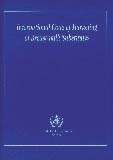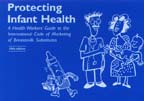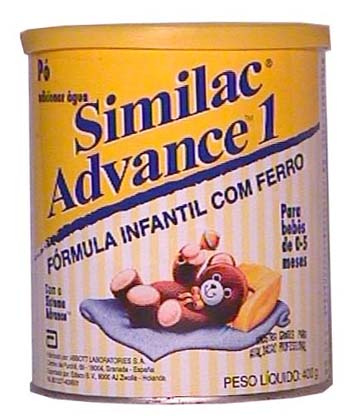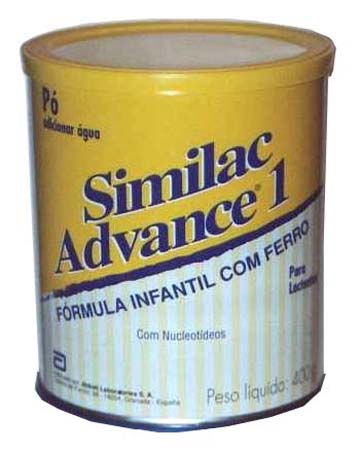 |
Protecting a mother's right to independent information on infant feedingAt talk by Mike Brady, Campaigns and Networking Coordinator, at an NHS Wales/Sure Start event in Cardiff for National Breastfeeding Awareness Week, 2007.You can listen to a podcast of this talk by clicking here or subscribing through iTunes (which is free). Or use this player: You can download the powerpoint projection by clicking here (12 MBytes) You can leave comments on Mike Brady's blog. I am delighted that Baby Milk Action was invited to participate in this event today and wish to thank the organisers. It shouldn ’t be me speaking to you today, it should be Patti Rundall, our Policy Director, but for unavoidable reasons, Patti is unable to be here so you are stuck with me I’m afraid. I know Patti is very disappointed not be here to speak to you. Let us hope you don ’t end up feeling the same way. Patti is half Welsh, as she likes to remind people. My Welsh connection is a little more tenuous. My father was evacuated to Tredegar during the blitz thanks to Adolf Hitler. We have been back to visit Wales for more pleasant reasons many times over the years. I’m pleased to be here today with my wife, Sonia, who is a Brazilian paediatrician. Sonia is with me on the stand we have in the hall. We met through the International Baby Food Action Network (IBFAN). IBFAN consists of more than 200 groups in over 100 countries. So when I say IBFAN is a strong international network, you can believe me. Baby Milk Action is the UK member of IBFAN. We were originally set up as the Baby Milk Action Coalition by development and mother support organisations at the end of the 1970s, when the whole baby milk issue was gaining public attention. We’ve been an independent not-for-profit organisation since 1985. There is a lot we could talk about concerning Baby Milk Action’s work. If Patti were here you would get a different talk to the one I am going to give. She is Policy Director and spends a lot of time pouring over consultations on new regulations and standards to ensure the best interests of infants and mothers are protected. It is Patti who goes to the World Health Assembly, which adopts Resolutions on infant feeding. As you probably know, the Assembly is made up of the world’s health ministries and is the world’s highest health policy setting body. It was under the auspices of the World Health Assembly that the International Code of Marketing of Breastmilk Substitutes was adopted in 1981. This came about as a result of the first Nestlé boycott campaign, which began in 1977. So this year we are marking the 30th anniversary of the launch of the first boycott. More about that later. That is my particular bag, being Campaigns and Networking Coordinator. I also tend to do more on liaising with overseas partners on what the companies are up to in their countries and run campaigns exposing and targeting abuses. In recent years I’ve been coordinating a UK monitoring campaign, which is the main thing I will talk about in the first part of this talk. Then I’ll move on to the international perspective and the boycott. The Code and the subsequent Resolutions adopted to address questions of interpretation and changes in scientific knowledge and company marketing practices are our principal campaigning tools. They are, I hope, something with which everyone here is familiar, because they are addressed to health workers as well as governments, companies and non-governmental organisations. The Code and Resolutions exist to protect all mothers and infants by ensuring that information on infant feeding is accurate and independent. They aim to protect breastfeeding AND ensure breastmilk substitutes are used safely if necessary. That AND is very important to remember, because sometimes when you mention the Code and Resolutions or the boycott some people close down, thinking you are setting out to make mothers who use formula feel bad. A charicature which I think is rarely justified of any breastfeeding advocates incidently. What we are talking about is independent information on infant feeding, a right which is enshrined in international law through the Convention on the Rights of the Child. Our government in the UK has been called on by the Committee on the Rights of the Child to implement the Code here. That was in its 2002 report. We are still waiting. Though there are moves in progress to revise the law. Implementing the Code and Resolutions forms part of the Global Strategy for Infant and Young Child Feeding. I don’t have a medical background, so I’m not going to attempt to present the benefits of breastfeeding or risks associated with formula feeding. That difference is at the root of the issue, however. It’s said so often that we hardly hear it anymore, but ‘breast is best’. Breastfed infants, epidemiologically speaking, develop better than artificially fed infants and are at less risk of short and long-term illness. While we do, of course, have to be sensitive in how that information is presented, if we are concerned about infant health we should not shy away from ensuring that information is well known. It is not anti-formula to do so. It is not an attempt to make mothers who use formula feel bad for doing so. It is providing the information that mothers need to make their decision on infant feeding. It must be coupled with support for mothers who have difficulties with breastfeeding. You know this better than me, but difficulties such as lack of milk due to poor let down and mastitis are not to be minimised. Mothers need support and it is currently lacking in this country. The governments own infant feeding surveys show that mothers who stop breastfeeding in the early weeks did not wish to stop, but encountered problems. Many mothers in this country do not even initiate breastfeeding. The previewed figure was 29% of mothers give no breastmilk. We’ll see with the new figures whether the initiation rate has budged from the 71% figure released last year. In Sweden 98% of mothers initiate breastfeeding and there is not the rapid decline we see in the UK. The difference is the culture, not the biology. Of mothers who stopped breastfeeding at 6 weeks, 9 out of 10 said that it had not been their intention to stop. So should they be viewed as failure? Most emphatically not. We have failed them. Mothers who do formula feed, for whatever reason, need support to do so safely. They need to know how to mix up bottles correctly. They need to know of the risks of intrinsic contamination of powdered infant formula with pathogens such as Enterobacter Sakazakii and the new guidelines on how to mix up formula to destroy any possible pathogens in the formula. I hope that prospectus sounds reasonable. It puts infant health and mothers’ rights at the centre of what we do. Independent information. Support when it is needed for all mothers, however they feed their infants. I hope it is not contentious. We are coming to the contentious bit. Where and how does the information come to mothers. Contentious because a factor other than health and rights enters the equation. Money, money, money, money, money, money. It is estimated that it costs UK parents about £650 to formula feed a baby for one year. So big business. In 2005 there were 722,500 births in the UK. And 29% of those babies receive formula from day one. Of those that are breastfed, the formula comes in for many days or weeks later. The UK baby food market was worth £329 million in 2004/05 and is set to grow by 20% by 2010. I thank Save the Children for putting together these latest figures. The government has a target for increasing breastfeeding rates, of 2% per year. It requires a multi-faceted approach. Improved maternity benefits. Better support. Better promotion of the benefits. A more supportive environment for breastfeeding in public. And so on. The points set out in the Breastfeeding Manifesto campaign which Baby Milk Action supports. We have cards you can send to your MPs asking them to support these policies. If we want mothers to be able to say they stopped breastfeeding because they decided it was time to stop, rather than because of other factors, then we need cultural change. But remember for every child that is breastfed rather than formula fed, that is less formula sold. For every extra day that a child is breastfed rather than formula fed, that is less formula sold. And less formula sold hits baby food company turnover and profits. There is a very interesting competition that has been going on between baby food companies. It is a competition to be seen as the closest to breastmilk. This may go disasterously wrong, but I will try to illustrate this. This is SMA formula as sold until recently. ‘Now even closer to breastmilk’. Let’s put that there. This is Farley’s formula, again as sold until recently. Again ‘ Closer than ever to breastmilk’. Let’s put that next to the SMA. Here is the Cow & Gate. ‘Closer than ever to breastmilk’. Put that one there. Here is Milupa Aptamil. ‘The closest to breastmilk’. Ah. Put that one there, cos it sounds a bit better. Oh, and there off. Milupa is edging ahead with its closest to brestmilk claim. The other formulas will have to pull something out of the bag if they are to catch up. What do we have. What do we have. Cow & Gate is making a sprint with its ‘prebiotics support natural defences’ claim. Its moving forward, that sound more impressive. Oh, Farley’s is throwing in ‘Nucleotides help growth and the immune system’. Must be good. Aptamil is falling back. No, it has ‘prebiotics support natural defences’, it’s drawing level again. Farley’s has ‘LCPs for development’. It’s a close fight. They are neck and neck. Wow, SMA has ‘helps brain and eye development’. Sounds good. It’s the same claim as the LCPs, but a bit more punchy. They are jostling for position. And of course, over here, way out in front, is breastfeeding. Loping along. Antibodies, got those. Bang. Zap those infection. LCPs – yup tailored to the child. Bomp. Prebiotics. Tens and tens of ‘em, not just two or three. Factor X. Still not discovered yet. Not synthesised. But look at the results. Babies are healthier, less likely to be obese… No-one is listening… cos, back here is where the action is. ‘Closer to breastmilk.’ ‘Closer to breastmilk’. ‘Closest to breastmilk’. The name of the game for the companies is to keep the attention focused here, even while all the time saying ‘breastmilk’, ‘immune system’, ‘development’. In practical terms the advertising spend for baby foods: £7,626,847 in 2006/07 according to Nielsen Research Multimedia. That’s an increase of 36.6% on the previous. Breastfeeding there, way out in front, has a promotional budget of £729,011 in 2006/07. That’s a decrease on the 2004/05 figure of £747,000. There is a poem that I saw in an anthology when I was a child. I have no idea why, but it has always stayed with me. This is the first time I ever recite it in public. It was lodged in memory for this day.
Gosh, I bet you wish you had Patti here. So more than 10 times the advertising spend by the baby food companies. Not just on formula. The figures don’t break that down. But their products are cross promotional, having the same brand names and logos in any case. And what is the impact? This is from a Department of Health Survey, 2005, with which you are probably familiar.
Let’s just think back to the Code and Resolutions. What do they say?
More generally, there should be no promotion of breastmilk substitutes or feeding bottles and teats to the public. Breastmilk substitutes means infant formula, follow-on formula or other substances marketed to replace breastmilk.
Companies are limited to providing scientific and factual information to health workers. It is for health workers to advise mothers. The Government is called on to implement these provisions as a minimum standard and to monitor compliance. It has not done so. Just a few provisions have been introduced in legislation. Health workers are called on to respect the provisions. And I am sorry to say, that is not always done. Non-governmental organisations are called on to report violations. We’re good we are. We do that. Companies are called on to abide by them, independently of government action. They don’t. They go to the limit of the law – and beyond. Here is what we find when we fulfil our mandate under the Code. These are some images from our rolling UK monitoring project. You can report violations using the forms you find on the Baby Feeding Law Group website. From reports from the public, health workers and monitors we have trained, give insight to how integrated the baby food company strategies are. They begin targeting women even before their infants are born. (See: Hard Sell Formula pamphlet or Powerpoint display for images and further explanation) They try to co-opt health workers to promote products to mothers. They bombard mothers with promotion. Without a strong law, there is little that can be done. But there are some things that can be done. On labels, there should be no idealizing text or images. The UK law has similar wording and list 6 claims that are permitted on labels. They are:
We have been calling for the law to be enforced since it was introduced and have presented evidence of violations and met with the authorities calling for action. After a meeting with LACORS last year, which is the umbrella body for Trading Standards, we saw new guidance issued stating clearly that only the 6 claims are permitted on labels and others are non-compliant. Some examples cited by LACORS…..
Nice phrase, non-compliant. I prefer, illegal. Against the law. Prohibited. Not allowed. For 12 years they have known they cannot make anything other than the claims on the permitted list and they have got away with putting these on labels. Remember the impact: 34% of mothers incorrectly believe that formula is the same or almost the same as breastfeeding, according to the Department of Health. Claims are generally promotional. Perhaps in some cases you do need information on composition highlighted, as with the permitted claims. But you’ll note those are simple statements of contents. Low sodium. That might be useful to know. But what about these others? LCPs. Long Chain Polyunsaturated Fatty Acids. “For brain and eye development” it says here. For brain and eye development. Proven to do this and that. Makes it sound close to breastmilk. But let us see what a review of the research has shown. This is from the Cochrane Library:
So even if a form of LCPs are in breastmilk, they seem to operate differently. Putting them in formula seems to make no difference to the development of infants, despite what the companies claim. Our view is that if a substance is necessary to reduce the negative health impact of formula it should be a requirement for all products. It shouldn’t be a marketing gimmick. The thing that gets me with any new-improved claim, is it is effectively saying, the old product was not so good. Why should there be not-so-good products on the market when we are talking about infant health? So if LCPs are important for development, as the companies claim, shouldn’t they be a requirement for all formulas? Well, the European Union's Scientific Committee has examined this question. It said:
So companies can include LCPs because they don’t seem to do any harm. But there is no requirement to do so, because there is no apparent benefit. That is a far cry from the message of the companies. Now why are they adding them? Because they can be added. They have the technology. Some years ago a company called Martek found a way to synthesise LCPs and manufacture them en-masse for addition to formulas. Their product was called Formulaid. Martek supplies most of the LCPs found in formula. A great business to be in, as market analysts realised when Formulaid was first put on the market. Here is what one said:
Very astute. Don’t you agree. What about prebiotics. Someone brought a claim about this ‘supports natural defences’ claim, used on labels and in advertising. This is what the Advertising Standards Authority said:
So again, you cannot trust companies as the source of information. (For further information see: It is not for companies to advise mothers. It is for health workers. So you need this information and, ideally, in a form that is independent and easily digestible. I’m interested to know your views on that at the end of this session. Do you feel you are getting the independent information you need about formula? If not, how can that best be achieved? Let me just show you what has happened as a result of this crackdown by the authorities on claims on labels. This is the Farley’s label. 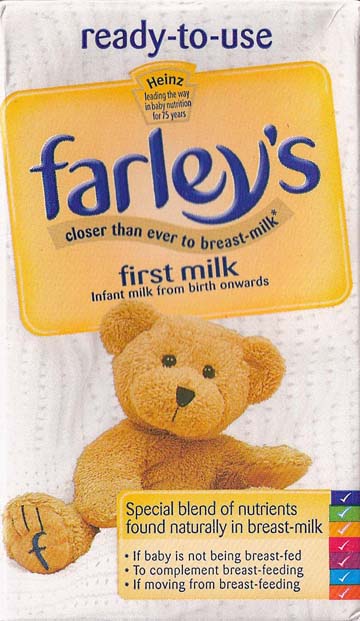 It was ‘now even closer to breastmilk’. It was ‘based on breastmilk’. It had a claim about LCPs amongst others. Here is the new label. Just arriving on the shelves now. 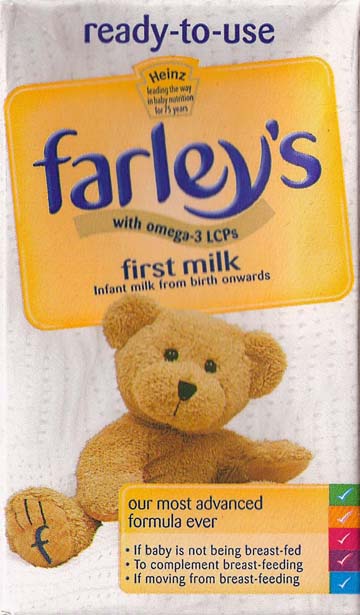
“Closer to breastmilk” has gone. “based on breastmilk” has gone. This is really significant. May not seem much at first sight. But we now have some clarity. This is infant formula. Full stop. A different type of substance to breastmilk. Manufactured. Inert. This illusion of equivalence with breastmilk is broken. For too long the ‘breast is best’ message was actually used not as an alert to mothers, but as an endorsement for the product. Breast is best and this is based on breastmilk, so it must be good. Formula is formula. Farley’s is flagging up this contains ‘Omega-3 LCPs’. That is illegal. It is not on the list of permitted claims. Heinz, that has done this, should be prosecuted for being non-compliant. Breaking the law. Why is it doing it? An LCP claim will be allowed with the changes agreed at European level. However, the Food Standards Agency is consulting as we speak on how to implement a revised EU Directive in UK law. We and the health worker bodies in the Baby Feeding Law Group are saying that permitted claims, which are about the contents of formula, should appear with the list of ingredients in text of stipulated wording and size. They should not be used for promotional purposes. They should not be banner flashes on labels like this. This is promotional. Heinz has unilaterally decided what the new law will be. It appears to be trying to bounce the consultation into accepting this. My view is the Trading Standards officers should prosecute this because it is illegal under the current law and the Food Standards Agency should get on with the consultation without having the thought that if they agree with the Baby Feeding Law Group it will complicate matters because this is already on the market. Heinz also had a prebiotics claim on its label. ‘Prebiotics support natural defences’. Again not on the list. Again there will be a permitted claim in future that a product contains prebiotics. Full stop. Again Heinz has already added this to its label in this flash, even though it is currently illegal and may be illegal in future. Let’s see Cow & Gate. 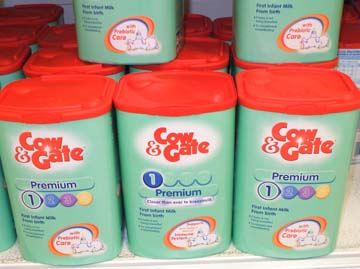 This is the old label. ‘Now even closer to breastmilk’ etc. New label. That has gone. ‘Prebiotics supporting your babies natural immune system’. On the old label. Illegal. New label ‘With prebiotic care’. Again currently illegal. Under the law to be introduced next year, they may be able to put with the list of ingredients ‘contains prebiotics’. This flash here, may continue to be illegal. Again they are trying to bounce the Food Standards Agency into permitting this. They do not even warn their consumers of risks with powdered formula and the way to reduce those risks. No doubt you are familiar with the guidance issued about Enterobacter Sakazakii contamination of formula. This is worryingly common. In a study cited by the US Food and Drug Administration, 14% of tins were found to have Enterobacter Sakazakii contamination. This can lead to illnesses such as meningitis and can result in death. Though cases are fortunately rare, that is little comfort to parents, particularly if a known risk is not communicated. It may well be that some of the greater incidence of illness amongst formula-fed infants is attributable to intrinsic contamination and this has not been appreciated to date. So the World Health Assembly is calling for warnings on labels and improved instructions. We want to see a warning that powdered formula is not sterile, because that is not generally appreciated. When it is understood, people better understand the reason for the new guidelines on formula preparation. Which is to mix up formula with water at 70 degrees. Companies are still refusing to add this to their labels. (For further information see: SMA has removed its ‘closer to breastmilk’ claim and come up with a new phrase and design. I made a little film about it. Here is the label. 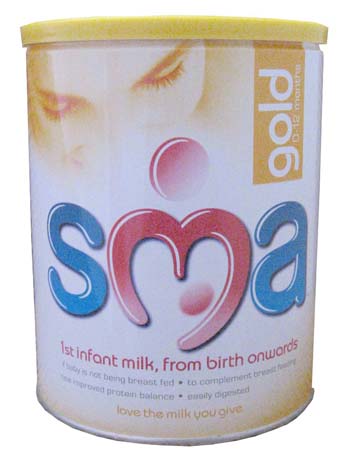
Commercial companies do not make changes that could have a negative impact on sales willingly. And they will try to make changes into a virtue. Here is what Wyeth SMA says about its new labels on an under-lid flier:
Wow! Nothing about the fact its labels have been illegal for the past 12 years and finally the law has caught up with it! It’s because SMA is responding to parents demands. SMA has a new illegal claim of ‘improved protein balance’. It is not on the permitted list. Whatever the benefits of this new formulation, for SMA it is a marketing gimmick. And they are calling no health workers to attend their training days so you will promote the formula to mothers. I would suggest, that companies should not have this role. They have demonstrated they cannot be trusted to give accurate information. They will always idealize their products. So we need better ways. There are resources that exist, of course, as an alternative to company-produced ones. And I hope we can talk through this more in the discussion. To finish, I want to look at the international situation briefly. The UK crackdown is having an international impact. This is coverage in the Philippines where the Ministry of Health introduced marketing regulations last year. They are being challenged in the courts by pharmaceutical companies that have agreed to change their labels in the UK. Nestlé isn’t one of the pharmaceutical companies, but it is trying to undermine the regulations in other ways. Here is one of its current labels in the Philippines. 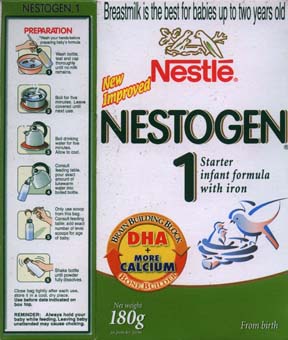
The phrase about breastmilk being best for babies, required by existing regulations, is undermined by Nestlé's health claim. It says the formula contains 'Brain building blocks', with claims about the LCPs that are not substantiated as discussed earlier. Globally we find that Nestlé is responsible for more violations of the marketing requirements than any other company. Not just the sort of things you see in this country, but other things such as inducements to health workers – bribes effectively – and provision of free samples and supplies to get babies onto the bottle before they leave hospital. In some countries, such as Taiwan, they pay the hospital per child for the right to provide their samples to mothers. Clearly there is also a failing on the part of the health care system in such cases to deal with the baby food industry in this way. Because of its status as the worst of the companies, Nestlé is the target of an international boycott and I would encourage you to investigate this and invite you to support it in solidarity with mothers and health workers in other countries. We have a wealth of information and resources to promote it. It has helped make Nestlé one of the four most boycotted companies on the planet, according to an independent survey. Nestlé currently only sells specialised formulas in this country. But it is on its third attempt to break into the market. It’s first two attempts in recent years failed. It is currently trying to persuade health workers to accept funding for materials on breastfeeding. You may have seen an article in the British Journal of Midwifery arguing for this and presenting a history of the baby milk issue. The article, produced by health workers who went on an all-expenses-paid trip to Nestlé in Switzerland to produce it is, at best, incompetent, as it contains many factual inaccuracies and misuses references. We had a long letter published in the BJM addressing some of these. Nestlé, however, is now distributing the article without our right to reply and we will be taking action over this. So please do let us know if you come across it. We have an in-depth analysis no our website. Saturday we are off to Croydon for our annual demo at Nestlé (UK) HQ. And boycott groups around the world have declared 2-8 July International Nestlé-Free Week. So we ask anyone who is not supporting the boycott throughout the year, does so at least during that week. There is far much more that could be said about our campaign. I will finish with some good news. Firstly on Nestlé. The boycott is long-running. But it has achieved results. We stop some of the violations we highlight, if we can shame Nestlé sufficiently. We have also prompted policy changes. During our national demonstrations in 2003 Nestlé agreed to stop promoting complementary foods from too early an age in some countries. Nine years earlier the World Health Assembly had called for complementary feeding to be fostered from about 6 months and Nestlé promoted, and still promotes in some countries, complementary foods from 4 months. After 9 years of campaigning it did announce changes in its own list of ‘developing’ countries. (For further information see:
Secondly, there are over 70 countries that now have legislation in place implementing the Code and Resolutions. In India, company sponsorship of health worker events is illegal. There was a voluntary ban by the paediatric association even before that came in. Worth remembering next time your colleagues complain an event won’t go ahead without sponsorship from a baby feeding company. For campaigners in Brazil, the UK seems a little backward, I am afraid. None of this sort of stuff is allowed. You can’t have and you don’t get teddy bears and other humanized images on labels of formula. Companies cannot produce or sponsor materials on infant feeding. The issues in Brazil are the strength of warnings on whole milks and company sponsorship of health worker events. Here is how the law is working there. This is an old tin of formula, with teddy bears like we have in the UK, even after the crack down.
Here's a label since they have implemented the International Code and subsequent, relevant Resolutions of the World Health Assembly.
What does this tin look like? A tin of nutritional medicine perhaps? Not a children’s toy or some advertising hoarding? It even carries a Ministry of Health warning in stipulated text.
We can implement and enforce
the Code and Resolutions if there is the political will.
We can protect infant health and mothers rights. For the benefit of breastfeeding and for the benefit of those who formula-feed. You can help globally by supporting the Nestlé boycott. Remember, while in the UK we are speaking of short and long-term impact on the health of infants when breastfeeding is undermined, globally we are talking about unnecessary deaths.
You can help in the UK by studying the marketing requirements and looking out for and reporting violations. You can encourage your colleagues to do the same and call on your professional associations to promote the Code and Resolutions and ensure they do not violate them in the advertising in journals or funding for events. You can send off a card calling for you political representatives to support the Breastfeeding Manifesto. You can download them from the website and we have them on the stand. I look forward to discussing more with you in the breaks and in question time. Thank you for your attention and putting up with my silliness. For further inforamtion contact mikebrady(AT)babymilkaction.org |

